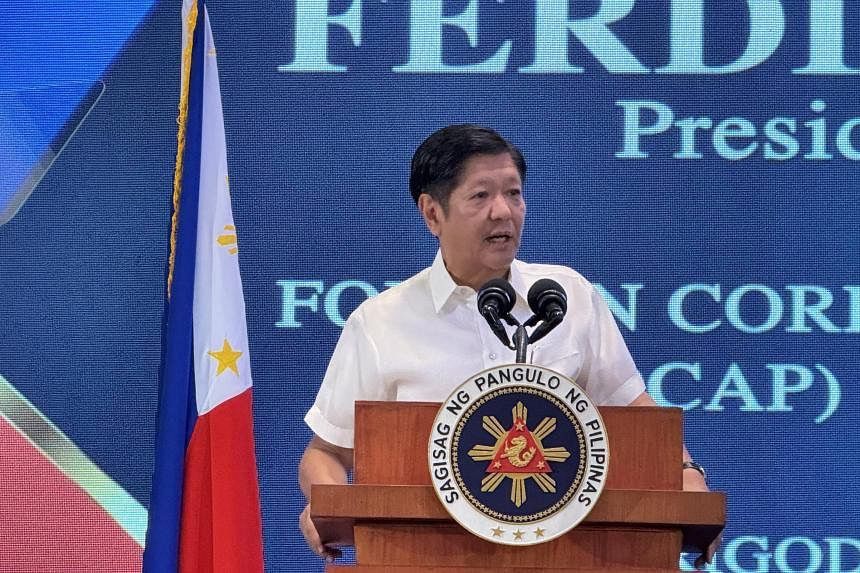MANILA – President Ferdinand Marcos Jr said the Philippines does not have any plan to give the US wider access to Philippine military bases, amid tensions with Beijing over South China Sea territorial disputes.
“The Philippines has no plan to give the US military access to more bases,” said Mr Marcos on April 15, in a forum hosted by the Foreign Correspondents Association of the Philippines, at the Manila Hotel in the capital.
The Philippine leader was speaking just days after a historic April 11 trilateral summit in Washington, where the leaders of the US, Japan and the Philippines hit back at China’s aggression in the disputed waterway.
US President Joe Biden also announced that he is seeking congressional approval for a US$128 million (S$174 million) budget to develop projects in the Philippine military bases where American troops currently have access.
In 2023, Mr Marcos agreed to expand the access of the US military from five to nine Philippine bases, under a 2014 defence deal that allows US forces to construct facilities, bring in equipment and hold joint training exercises in mutually agreed-upon bases in the Philippines.
The Enhanced Defence Cooperation Agreement (EDCA), as the deal is called, also allows the US to rotate troops into the Philippines for extended stays, but does not grant them permanent presence in the country.
American troops have access to Philippine military sites in the western Philippine coast facing the South China Sea as well as northern areas near Taiwan, the self-ruled island that Beijing considers part of its territory.
Philippine officials earlier said the EDCA expansion was not meant to target China, but Mr Marcos said during the forum that his decision in 2023 was a “reaction to what has happened in the South China Sea”.
Still, Mr Marcos insisted that the US-Japan-Philippines trilateral summit last week was not meant to target any particular country.
“It is not directed at anyone or against anyone. It is merely a strengthening or formalisation or institutionalising, I suppose, of the relationship of US, Japan and the Philippines,” he said at the Manila Hotel.
Tensions have risen between Manila and Beijing in the past months, as the China coast guard fired water cannon at Philippine vessels taking supplies to soldiers stationed at a World War II-era warship grounded at the Second Thomas Shoal in the South China Sea.
The submerged reef is located within the Philippines’ exclusive economic zone, but China is claiming it as its own.
A 2016 international arbitral tribunal ruling had rejected Beijing’s sweeping claim over most of the South China Sea, which is also being claimed by four Asean countries – the Philippines, Brunei, Malaysia and Vietnam – as well as Taiwan.
Beijing, however, has refused to recognise this ruling and has ramped up its military presence and artificial island-building activities in the disputed waters.
Chinese actions have pushed Mr Marcos to beef up security and defence cooperation with the Philippines’ military allies like the US and Japan. But he also continues to foster economic relations with China, which remains the country’s largest trading partner.
Mr Marcos said, however, that he does not see the trilateral summit with the US and Japan affecting Chinese investments in the Philippines.
“This (trilateral summit) is separate from any proposed or potential Chinese investments in the Philippines... I don’t see that it will affect (Chinese projects here), one way or the other,” he said.


